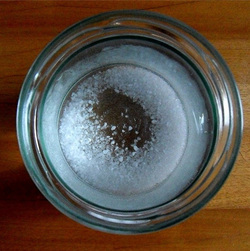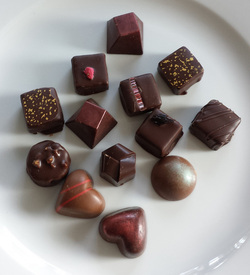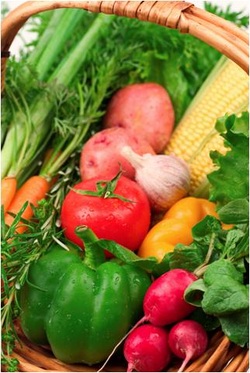
As with fat and sugar, you are hard-wired to love the taste of salt - and it's no wonder why, as salt, like fat, is also essential for health. However, unlike fat (and sugar), your body can't produce salt on its own - it has to come from dietary sources. Salt is included in many, many bodily processes - and I won't get too technical here, but if you're an athlete, you know how important electrolytes are for maintaining hydration and keeping your bodily functions going. Salt is included in every bodily fluid, and sodium chloride is the major electrolyte that your body uses to keep your cells properly balanced and functioning. Salt also helps transport toxins out of the body, conduct electrical impulses in the brain and body, keep your blood at the right pH level, and much more. As with fat, you would die without salt. Your taste buds know this - and so do the food processing companies! So they give it to you - and a lot of it - in just about every processed food known to man.
Personally, salt is my main craving. I can do just fine without sugar (unless I've become temporarily addicted to it - which happens a couple of times per year - especially around the holidays), and I love fat, but I don't feel deprived of it, since I make sure to include enough good fats in my diet. I can walk right by a plate of brownies, cookies, or a cake at a party, with barely a glance. But that bag of Doritos is another story.... (Yes, I - a self-proclaimed health nut - love me some spicy nacho cheese Doritos!) Who knows why that's my weakness? The rest of my family are all sugar-a-holics, but I've always been all about the salt.
Back to Our Sugar Addiction for a Moment....

If you think this sounds impossible for you, I assure you, it's not. You won't actually die without chocolate. :-) And you can make it through the day without a soda (or two, or five....). If you're a hard-core sugar-a-holic, and you really do drink 5 cans of soda per day (impossible for me to imagine, but I know it happens - probably way more often than I know), you may have to cut down gradually.
Soda is a great example, and if you drink a lot of it, it can be an easy way to start. Try just reducing your intake by one can per day, and over a few weeks, wean yourself down to just one. Easy tip: Try keeping a bottle of water on your desk next to you at work. You'll find you drink when you're thirsty without even thinking about it, and you'll stay hydrated and not drink all the other junk. If you drink soda for the caffeine, try switching to a cup of coffee per day - you'll get all the caffeine without the sugar and other chemicals. Or better yet - try green tea. Even better still - get some extra sleep, exercise, and eat real, fresh, whole foods, and you won't need all that caffeine anymore anyway!
But what about the sugar in everything else? What about our junk food habit? How can you break the habit, and eat healthier? You might be mad at me when I say this, but despite all of the advice out there, the simplest way usually really is the best.
If you want to eat less crap....just stop buying it!
Seriously! This really is the best, simplest, and easiest way to stop eating junk foods. Most of our bad food habits come from what I call the crime of convenience. Just like crimes of opportunity, crimes of convenience happen because they can. And they are committed every day, in our own homes, against our own bodies. In order to stop these crimes from occurring, you have to remove the junk foods from your home, and then you have to make a commitment to yourself and your family not to bring them in anymore.
Now, obviously this kind of "cold turkey" thing can be pretty difficult at first, especially if you're used to eating a lot of junk food. So here are a couple of tips that can help:
1. Give yourself a time-frame: Say that you are going to remove all junk foods from your house, and not purchase any more - for a specified period of time (a month is probably a good time period to shoot for for most families). After that time, you will permit yourself one junk food item of your choosing on specified occasions (e.g. holidays, birthdays, or once per month, etc.). This gives you the incentive to make it through the first month, and it also allows you the relief of knowing you're not completely giving up your favorite snack forever - you'll just be eating it less often. I buy a bag of chips about once a month or so. It's a special treat, although as I eat them less often, I find that I like them less and less anyway!
2. Allow yourself to have your favorite junk food as a reward. Set specific goals you wish to achieve - preferably health-related, although you can do it for other goals as well - and reward yourself with (a small portion) of your favorite junk food. Just be careful not to let this happen too often. If you allow yourself a bowl of ice cream every time you take a walk around the block, you won't be doing your health any favors! Save these small but enjoyable rewards for the really big goals (losing 15 lbs, completing a long and complex project, etc.), and enjoy them as the special occasions they should be.

If you have kids (or even if you don't), cut up some veggies into easy-to-eat pieces every couple of days, and keep them in a container in the fridge for easy snacking. Fresh veggies such as carrots, cucumbers, cherry tomatoes, and cauliflower are delicious with some sort of dip or dressing containing - guess what - fat and salt! Yum! And you don't have to feel bad about it either. In fact, did you know that many of the nutrients in vegetables are absorbed by the body much better if you eat them with a bit of fat? Whoever invented salad dressing may not have known this scientific fact, but our biology is sometimes pretty smart!
Summing It All Up:
We are all human, and humans don't always do what's in our long-term best interest. The way we eat, spend our money, relate to each other, and treat our planet are all the proof you need of that! The fact is, no matter how evolved we think we are, we are all, in part, controlled by our biology, and it's in our DNA to love foods that taste good to us - that is, foods that taste like the main elements we need for life - fat, sugar, and salt.
You can sit around and blame your biology, but no matter what you do, you will never change it. No matter how many diets you go on, how much therapy you undergo, or what kind of drugs the pharmaceutical companies cook up to mess with our brain chemistry and try to change our eating habits, you will always want to eat these 3 things. It's just the way God made you - and that's not a bad thing!
Where we fall down is when we allow ourselves unfettered access to unlimited amounts of these things (or their unhealthy substitutes) - especially in a processed form that is ultimately detrimental to our health. As early humans, all of these substances were in short supply - which is partly why we crave them so much. In today's modern world, we have to control these biological urges, and realize that we live in a much different world than our ancestors did, and that we have to learn to exercise more self-control than they did. This is far from impossible. This is why we have the great brains that we do - so that we can make higher decisions for the good of our long-term health and longevity!
So use your brain. Don't let your biology - or even worse - an industrial food processing company - tell you what you should be eating all the time. Read this blog. Subscribe to our newsletter. Educate yourself on what to eat. Exercise self-control. Enjoy the things you crave from time to time, but always in moderation. Buy good, healthy, whole, natural foods. Eat what God made - and eat it the way He made it!
To your good health,
Rose.



 RSS Feed
RSS Feed